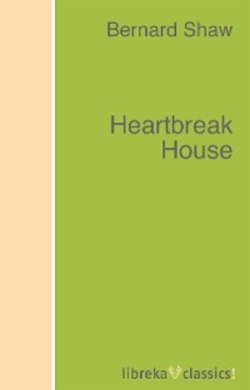Heartbreak House

Реклама. ООО «ЛитРес», ИНН: 7719571260.
Отрывок из книги
Where Heartbreak House Stands
Heartbreak House is not merely the name of the play which follows this preface. It is cultured, leisured Europe before the war. When the play was begun not a shot had been fired; and only the professional diplomatists and the very few amateurs whose hobby is foreign policy even knew that the guns were loaded. A Russian playwright, Tchekov, had produced four fascinating dramatic studies of Heartbreak House, of which three, The Cherry Orchard, Uncle Vanya, and The Seagull, had been performed in England. Tolstoy, in his Fruits of Enlightenment, had shown us through it in his most ferociously contemptuous manner. Tolstoy did not waste any sympathy on it: it was to him the house in which Europe was stifling its soul; and he knew that our utter enervation and futilization in that overheated drawingroom atmosphere was delivering the world over to the control of ignorant and soulless cunning and energy, with the frightful consequences which have now overtaken it. Tolstoy was no pessimist: he was not disposed to leave the house standing if he could bring it down about the ears of its pretty and amiable voluptuaries; and he wielded the pickaxe with a will. He treated the case of the inmates as one of opium poisoning, to be dealt with by seizing the patients roughly and exercising them violently until they were broad awake. Tchekov, more of a fatalist, had no faith in these charming people extricating themselves. They would, he thought, be sold up and sent adrift by the bailiffs; and he therefore had no scruple in exploiting and even flattering their charm.
.....
The Wicked Half Century
It is difficult to say whether indifference and neglect are worse than false doctrine; but Heartbreak House and Horseback Hall unfortunately suffered from both. For half a century before the war civilization had been going to the devil very precipitately under the influence of a pseudo-science as disastrous as the blackest Calvinism. Calvinism taught that as we are predestinately saved or damned, nothing that we can do can alter our destiny. Still, as Calvinism gave the individual no clue as to whether he had drawn a lucky number or an unlucky one, it left him a fairly strong interest in encouraging his hopes of salvation and allaying his fear of damnation by behaving as one of the elect might be expected to behave rather than as one of the reprobate. But in the middle of the nineteenth century naturalists and physicists assured the world, in the name of Science, that salvation and damnation are all nonsense, and that predestination is the central truth of religion, inasmuch as human beings are produced by their environment, their sins and good deeds being only a series of chemical and mechanical reactions over which they have no control. Such figments as mind, choice, purpose, conscience, will, and so forth, are, they taught, mere illusions, produced because they are useful in the continual struggle of the human machine to maintain its environment in a favorable condition, a process incidentally involving the ruthless destruction or subjection of its competitors for the supply (assumed to be limited) of subsistence available. We taught Prussia this religion; and Prussia bettered our instruction so effectively that we presently found ourselves confronted with the necessity of destroying Prussia to prevent Prussia destroying us. And that has just ended in each destroying the other to an extent doubtfully reparable in our time.
.....